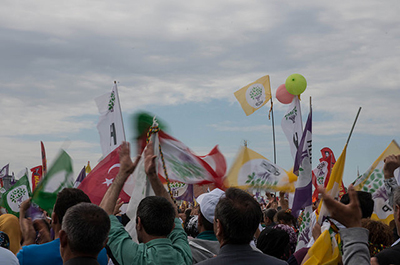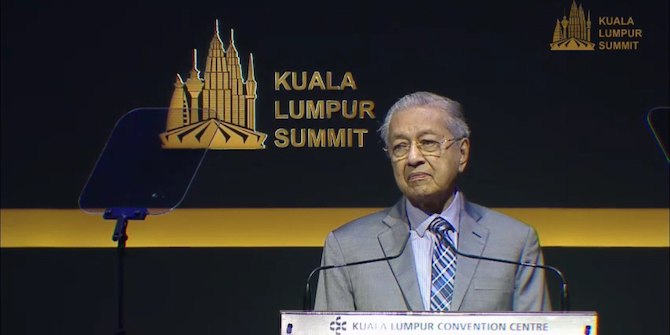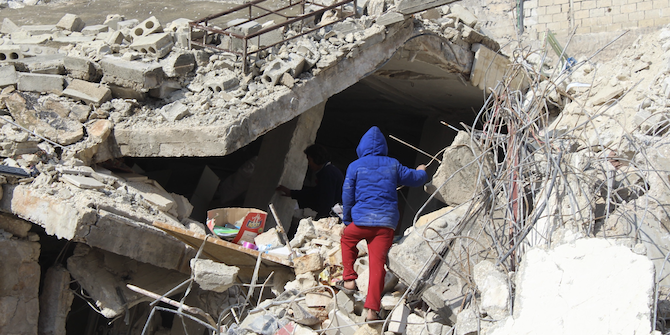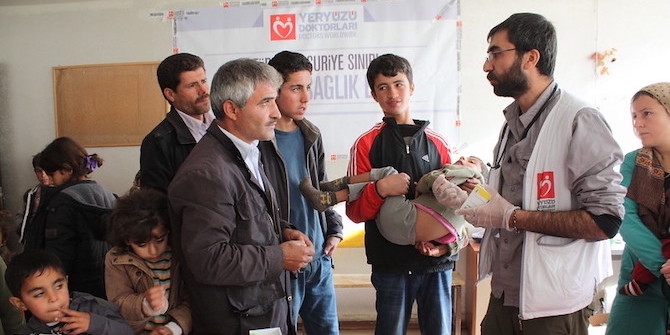by Nathaniel Handy
The Justice and Development Party’s nationalist gamble is a mistake in terms of immediate electoral aims and wider strategic goals for Turkey, writes Nathaniel Handy in a piece that was originally published by Fair Observer.

It has been well-documented that the current Turkish government offensive against the Islamic State (IS) is largely being conducted as a cover for a far wider assault against the Kurdistan Workers’ Party (PKK) and the People’s Protection Units (YPG) of the closely aligned Democratic Union Party (PYD) in Syria. Both in terms of arrests and airstrikes, PKK and YPG targets have been greater in numbers than those of IS.
Given the Turkish government’s policy to date regarding the Islamic State, in which it has been conspicuously reticent about joining the US-led campaign against the organisation, this is perhaps unsurprising. This reticence compounded a situation where Turkish authorities have appeared to tolerate IS cross-border activity, bringing fighters and supplies into northern Syria via Turkey.
However, the decision to pursue PKK and YPG targets can be viewed as a strategic mistake on the part of the Turkish government for several reasons: It does not advance broader Turkish foreign policy goals in either Syria or Iraq; it increases instability within Turkey; and the evidence suggests it may be ineffective in securing the majority the Justice and Development Party (AKP) seeks at the next general election in November.
Targeting the Kurds
The catalyst for the Turkish decision to join the US coalition and allow the Americans to use Incirlik airbase was a suicide bomb attack in Suruc near the Turkish-Syrian border on July 20. This was the latest in a string of border region attacks. However, while previous incidents, such as one in the border town of Reyhanli on May 11, 2013, were regarded as the work of people linked to the Syrian regime, the Suruc attack was carried out by a lone perpetrator inspired by the Islamic State. It specifically targeted Kurds heading to Kobane in northern Syria to help with reconstruction after the IS siege of the town.

As a catalyst for a campaign against Kurdish groups, then, this is a curious one. They were not the perpetrators, but rather the victims of the violence. In fact, the only recent Kurdish disturbances within Turkey, where a fragile ceasefire had been in place between the PKK and the Turkish government, was when Turkey failed to offer assistance to Kobane when it came under attack by IS in September 2014. This revealed the wider Turkish policy against YPG-controlled areas of Syria. This policy has been—and remains—one of resisting moves toward Kurdish autonomy in the Rojava (East Kurdistan) region made up of the enclaves of Jazira, Kobane and Afrin.
Turkish Foreign Policy
The current offensive against the PKK and YPG is liable to backfire in terms of Turkey’s foreign policy goals in both Syria and Iraq.
In Syria, such an offensive will inevitably drive the YPG and its political body, the PYD, into the arms of the Syrian regime, since Damascus will offer the only protection, however temporary, against attacks from Turkey and IS. Turkish engagement with the PKK through its imprisoned leader, Abdullah Ocalan, and by extension with the PYD, could have developed an important proxy force for Turkey, one that has proved capable of holding ground in northern Syria and could assist in removing the Assad regime—a key goal of the Turkish government.
In Iraq, the sustained bombardment of PKK positions in the Qandil Mountains puts a strain on the relationship with President Massoud Barzani’s ruling Kurdistan Democratic Party (KDP). While the KDP and the PKK are certainly not bedfellows, Barzani’s pretension to lead the wider Kurdish national movement is undermined if a close ally such as Turkey is seen to be bombing and killing fellow Kurds.
Politics inside Turkey
An equally grave strategic failure is occurring for the ruling AKP in terms of internal Turkish politics. As analysts have observed, the AKP have made the calculation that to obtain the majority they seek in November’s election, they need to court the Turkish nationalist vote. The AKP require a parliamentary majority in order to unilaterally alter the military-era constitution to strengthen the presidency, a key goal of President Recep Tayyip Erdogan.

The Peoples’ Democratic Party (HDP), which is pro-Kurdish, are strongly opposed to a more presidential political system, and yet they are also the only other party with a significant vested interest in altering the military-era constitution, which discriminates against Kurdish interests. Neither the Nationalist Movement Party (MHP), nor the more centrist Republican People’s Party (CHP) have anything to gain from a rewriting of the constitution.
At the 2015 general election, where the AKP vote share dropped by nearly 10% compared to the previous general election of 2011, the nationalist MHP received 16.2% of the votes, while the pro-Kurdish HDP took 13.4%. The AKP have assessed that to attack the PKK and halt the peace process will garner votes from the nationalist base. This assessment is based on the significant MHP vote across central Turkish provinces and represents a calculation that would move the AKP voters base in a nationalist direction.
However, there is also a more liberal constituency to the AKP voters base that saw considerable opportunities in a peace settlement with the Kurdish PKK. Moreover, the only party that can make any headway against the pro-Kurdish HDP in the Kurdish-majority southeast is the AKP, since the CHP and MHP have no representation at all in this region.
The 2015 results were striking not for the strong nationalist vote, which at 16.2% was relatively consistent with previous ones (15.9% in the local elections of 2014 and 12.9% at the 2011 general election), but for the huge surge in support for the pro-Kurdish party. The HDP managed to gather 13.4% of the votes, more than doubling the votes achieved by previous pro-Kurdish entities (with the caveat that the HDP is an umbrella party that includes the pro-Kurdish Peace and Democracy Party and smaller left-wing Turkish parties).
The constituencies that can be viewed as broadly Kemalist in ideology (the CHP and MHP) have remained remarkably constant for years. The CHP have taken roughly a quarter of the vote in the last three elections and the MHP takes 6-7 million votes. It is the AKP and pro-Kurdish votes that have been in flux, most starkly at the last election in 2015, where the AKP vote fell by almost the same amount as the pro-Kurdish vote rose. This would suggest the AKP lost votes to the HDP due to increasing authoritarianism and lack of consensus politics from President Erdogan, rather than losing votes to the nationalist MHP. By this estimate, a policy in pursuit of accord with the Kurdish PKK would be more likely to bring votes to the AKP than one of attack.
By choosing conservative Turkish nationalist voters over Kurdish or liberal voters, the AKP have made a choice that could have profound consequences for Turkish politics and society in the future. Whether voters will cross the floor to the Islamist AKP from the nationalist parties in significant numbers remains to be seen. But it would be wise for the AKP to remember that Islamists were as much the enemies of the Kemalist state as were Kurds in the 20th century.
In choosing their friends on the nationalist end of the spectrum, the AKP may find themselves losing influence not only among Kurds at home and abroad, but also in foreign capitals from Baghdad to Brussels.
 Nathaniel Handy is a writer and academic with fifteen years of experience in international print and broadcast media. He holds an MA in Middle East Studies from the Institute of Arab and Islamic Studies at the University of Exeter and is the author of the monograph ‘Turkey’s Shifting Relations with its Middle East Neighbors During the Davutoglu Era: History, Power and Policy‘ (Bilgi Dergisi Journal, 2011). He tweets at @padstm.
Nathaniel Handy is a writer and academic with fifteen years of experience in international print and broadcast media. He holds an MA in Middle East Studies from the Institute of Arab and Islamic Studies at the University of Exeter and is the author of the monograph ‘Turkey’s Shifting Relations with its Middle East Neighbors During the Davutoglu Era: History, Power and Policy‘ (Bilgi Dergisi Journal, 2011). He tweets at @padstm.






